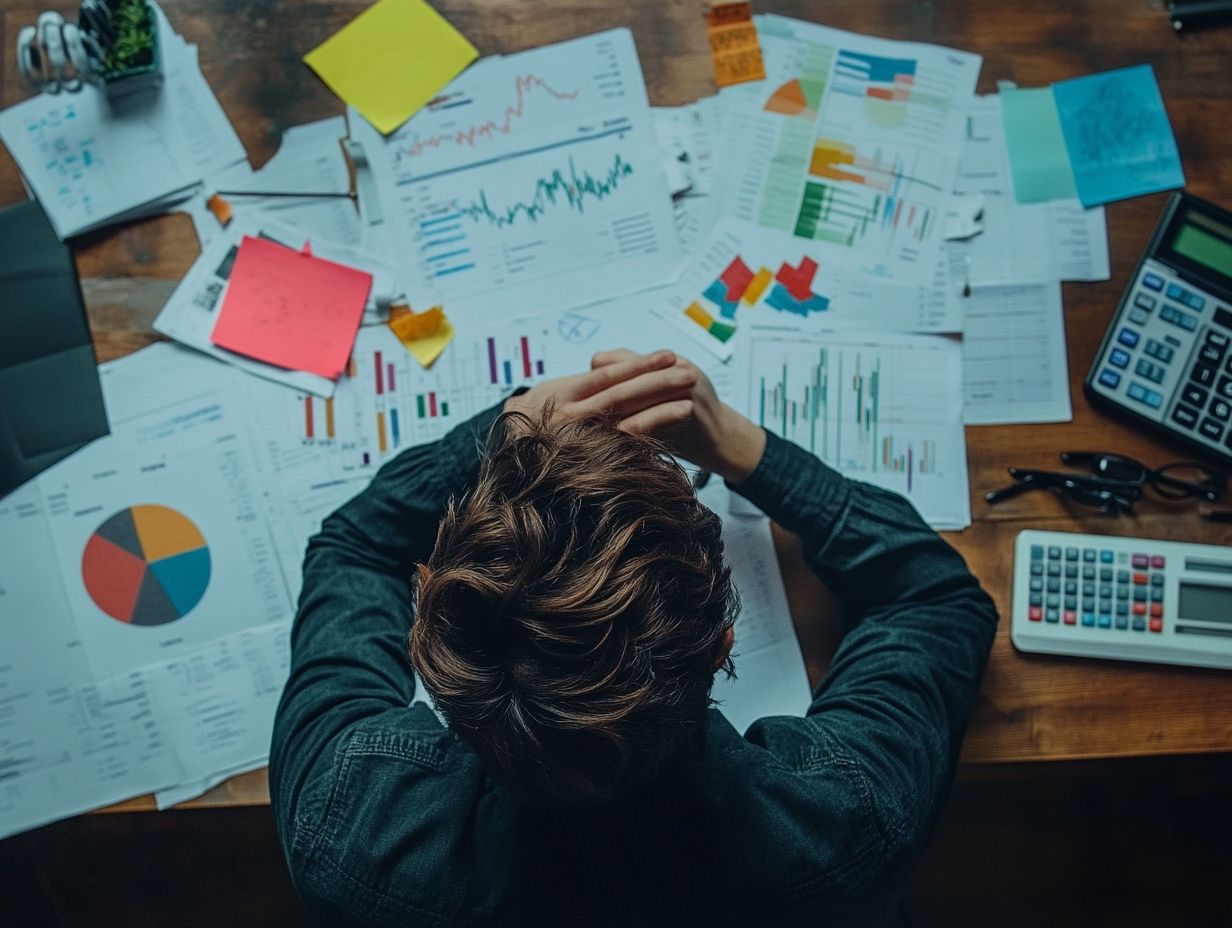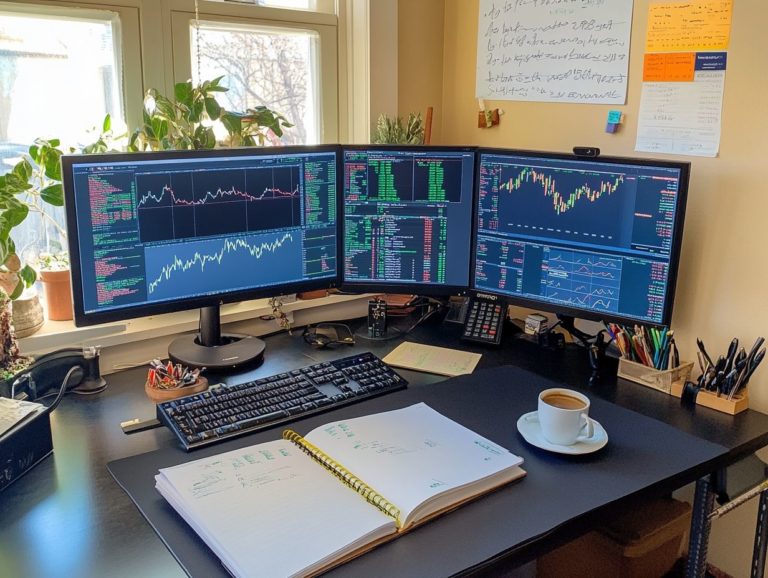The Science of Trading Psychology Explained
Trading is more than just numbers and strategies; it’s deeply rooted in psychology. If you want to succeed, understanding your emotions is critical. They influence your decisions in powerful ways.
This article explores how emotions impact trading and highlights common emotional traps and psychological biases that can derail even the most experienced traders.
You will also learn essential habits for developing a strong trading mindset and when it may be helpful to seek professional support.
Whether you’re a beginner or a seasoned trader, mastering your psychological approach could be the key to your success.
Contents
Key Takeaways:

- Emotions play a crucial role in trading decisions, leading to common traps such as fear, greed, and overconfidence.
- Psychological biases can significantly affect trading performance, but you can overcome them through self-awareness and disciplined practices.
- Building a strong trading mindset involves maintaining emotional discipline and seeking professional help when necessary.
Understanding Trading Psychology
Understanding trading psychology is essential for achieving consistent success in the stock market. It involves the emotional intelligence and mental frameworks that shape your behavior as a trader, including understanding the emotional cycle of trading.
By examining your unique traits that affect how you trade, you can gain greater self-awareness and improve your performance. Insights from experts like Dr. Brett Steenbarger stress the importance of mastering your own trading mindset, which helps you navigate the complexities of financial markets with confidence.
Definition and Importance
Trading psychology includes the mental and emotional factors that impact your decision-making and, ultimately, your trading performance.
Understanding trading psychology reveals how emotions like fear, greed, and impatience can cloud your judgment and lead to rash actions. Successful traders know that discipline is key. They stick to their strategies even when the market is volatile, recognizing that financial markets are shaped by both numbers and human behaviors.
By managing these emotional hurdles and grasping market dynamics, you can create effective strategies that maximize profits while managing risks effectively.
Emotions in Trading
Emotions heavily influence your trading journey, often pushing you toward the fear of missing out or leading to impulsive decisions driven by herd mentality, fear, and greed. Mastering your emotions is vital for your success!
Impact on Decision Making
Your emotional state significantly impacts your decision-making process, often pulling you away from disciplined strategies.
When you let fear or greed take control, you risk deviating from your carefully laid plans. For instance, a trader who panics during a market downturn might hastily sell their assets, cementing their losses instead of adhering to a long-term investment strategy.
Conversely, an inflated sense of confidence might drive you to make rash decisions, exposing you to risks that could backfire dramatically. This is where emotional intelligence becomes critical. By recognizing and managing these emotions, you can sustain focus and discipline, paving the way for more rational and rewarding trading choices.
Common Emotional Traps

Emotional traps like chasing losses and excessive profit-taking can derail your trading strategy.
These issues often arise during the stock market cycle. Fear and greed can cloud your judgment and lead to poor decisions.
For example, during bullish phases, the urge to secure profits might make you exit positions too early. This could cause you to miss out on significant gains.
In bearish periods, anxiety about potential losses can lead you to hold onto underperforming investments, hoping for a turnaround.
To navigate these traps, maintain a disciplined trading plan with clear entry and exit points. Use mindfulness techniques and regular self-reflection to recognize when emotions influence your decisions.
This approach helps you adopt a balanced perspective and enhances your trading outcomes.
Psychological Biases in Trading
Psychological biases are mental shortcuts that can lead to poor judgment. These biases can affect your trading discipline and decision-making.
It’s crucial to recognize these biases to maintain clarity and discipline in your trading strategy.
Types of Biases
As a trader, you might encounter various cognitive biases, such as confirmation bias, loss aversion, and overconfidence. Each shapes your decision-making in unique ways.
For instance, confirmation bias may lead you to focus only on information that supports your existing positions. This habit can cause you to hold onto losing trades longer than necessary, increasing your losses.
Loss aversion can make you avoid risks that have potential rewards, even when the benefits outweigh the downsides.
Moreover, overconfidence may lead you to overestimate your knowledge, resulting in excessive trading or taking on positions that exceed your risk tolerance.
It’s essential to recognize these biases, as they can undermine your trading discipline and overall performance.
How to Overcome Biases
Overcoming psychological biases requires deliberate bias mitigation techniques and a commitment to disciplined trading strategies based on self-awareness.
Consider maintaining a comprehensive trading journal that includes not only your trades but also the thought processes and emotions accompanying your decisions.
Regularly reviewing these entries can help you uncover patterns of bias that might cloud your judgment. Seek constructive feedback from peers or mentors to illuminate blind spots.
Cultivating self-awareness through mindfulness practices enhances your ability to recognize and manage emotional triggers. This approach leads to better decision-making and improved trading outcomes.
Developing a Strong Trading Mindset
Cultivating a robust trading mindset is vital for navigating the emotional landscape of trading. Focus on honing your trading discipline, enhancing your emotional intelligence, and deepening your self-awareness.
By concentrating on these elements, you prepare yourself to face challenges with confidence and clarity.
Don’t let biases ruin your trading success! Take control and sharpen your decision-making skills today.
Key Habits and Practices

In cultivating a strong trading mindset, you’ll find that certain key habits and practices, like maintaining consistent trading routines and exercising self-discipline, are essential for your success.
It s not merely about executing trades; it s about developing a structured method that instills you with confidence and clarity. Establishing daily routines can help you stay grounded in your strategies, allowing you to approach each trading session with a focused mind.
By nurturing self-discipline, you enable yourself to stick to predefined strategies, effectively curbing those impulsive decisions that often lead to significant losses. These practices work together to mitigate emotional challenges such as fear and greed, helping you remain objective and patient.
This, in turn, enhances your overall performance in the ever-fluctuating market landscape.
Maintaining Emotional Discipline
Maintaining emotional discipline in trading is essential for executing well-planned strategies without giving in to pesky emotional impulses. This crucial skill enables you to navigate the unpredictable market landscape with clarity, which is key for making rational decisions.
When you encounter emotional triggers, it’s easy to abandon established strategies, leading to impulsive actions that can result in losses. To nurture this discipline, setting clear and achievable goals is vital; it provides a benchmark against which you can measure your performance.
Mindfulness techniques can help you stay grounded during those tumultuous market shifts, fostering a balanced perspective. Regular self-checks are equally important, as they encourage you to identify emotional patterns and adjust your strategies, ultimately enhancing your resilience and decision-making capabilities.
Seeking Professional Help
Seeking professional help is a game-changer for traders facing emotional challenges. Therapy offers essential tools that can significantly enhance your trading performance. Don’t wait too long to seek help if you’re facing emotional challenges!
When to Consider Therapy
You should seriously consider therapy if you find yourself grappling with emotional challenges that are affecting your trading performance and decision-making abilities.
Recognizing those telltale signs of recurring emotional struggles like anxiety, frustration, or overwhelming stress is crucial for anyone in the trading arena. When you consistently face poor outcomes, it can spiral into a cycle of negative thinking that clouds your judgment.
Engaging in therapy can offer valuable insights, fostering self-awareness that helps you pinpoint emotional triggers and behavioral patterns. With the right therapeutic techniques, you can arm yourself with effective coping strategies, allowing you to manage your emotions better and elevate your performance in the competitive world of trading.
Frequently Asked Questions
What is the science of trading psychology?

The science of trading psychology is the study of how human emotions and behaviors influence trading decisions and market outcomes. It combines elements of psychology, neuroscience, and economics to understand the psychology of market trends and how traders make decisions and react to market conditions.
Why is understanding trading psychology important?
Understanding trading psychology is important because it can help traders make more informed and rational decisions. By understanding the role of cognitive bias in trading, traders can develop strategies to manage risk and improve their trading performance.
What are some common psychological biases in trading?
Some common psychological biases in trading include fear of missing out (FOMO), confirmation bias, and overconfidence. FOMO means worrying about missing a profitable opportunity. These biases are mental shortcuts that can skew your trading decisions, leading to impulsive and irrational behavior, causing traders to make poor decisions and potentially lose money.
How can traders manage their emotions while trading?
Traders can manage their emotions by developing self-awareness and practicing mindfulness. Techniques like deep breathing and visualization can help.
Having a solid trading plan is essential. Stick to your plan and avoid impulsive decisions fueled by emotions.
What role does discipline play in trading psychology?
Discipline is key in trading psychology. It means adhering to your trading plan and controlling impulsive behaviors.
Without discipline, traders may make emotional decisions that lead to losses. Staying disciplined can protect your investments.
How can traders improve their trading psychology?
Traders can enhance their psychology by seeking education and training in the field. Working with a coach or mentor can also provide valuable insights.
Regularly evaluate and adjust your strategies. Don’t forget to take care of your physical and mental health to maintain focus while trading!






